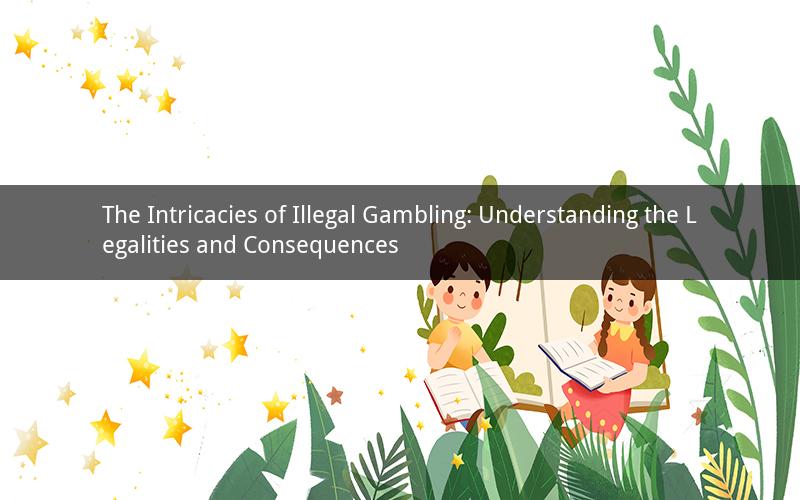
Illegal gambling is a complex issue that affects individuals, communities, and even entire nations. The question of how gambling becomes illegal is multifaceted, involving various legal frameworks, societal values, and the potential risks associated with gambling. This article delves into the reasons behind the illegality of gambling, the legal consequences, and the broader implications of such regulations.
1. The Legal Framework of Illegal Gambling
The legality of gambling varies from one country to another, and even within a single country, different forms of gambling may be legal or illegal. The legal framework of illegal gambling typically involves the following elements:
a. Prohibition of certain forms of gambling: Many countries have banned certain types of gambling, such as online gambling, poker, or sports betting. These bans are usually in place to protect citizens from the potential harm associated with these activities.
b. Age restrictions: Many countries impose age limits on gambling, requiring individuals to be of a certain age to participate in legal gambling activities. Illegal gambling often involves individuals under the legal age, which is a significant factor in its illegality.
c. Licensing requirements: Legal gambling operations must obtain licenses from government authorities to operate. Illegal gambling activities often occur without proper licensing, making them illegal.
2. Societal Values and the Perception of Risk
The perception of risk and societal values play a crucial role in determining the legality of gambling. Here are some key factors:
a. The potential for addiction: One of the primary reasons for the illegality of gambling is the risk of addiction. Governments and societies often view gambling as a harmful activity that can lead to financial and emotional distress.
b. The potential for crime: Illegal gambling is often associated with criminal activities, such as money laundering, corruption, and organized crime. The illegal nature of gambling makes it difficult to regulate and monitor, increasing the potential for criminal involvement.
c. The impact on vulnerable populations: Illegal gambling can have a significant impact on vulnerable populations, such as minors, the elderly, and individuals with gambling addictions. This concern often leads to stricter regulations and bans on gambling activities.
3. The Legal Consequences of Illegal Gambling
Engaging in illegal gambling can result in various legal consequences, including:
a. Fines: Individuals caught engaging in illegal gambling may face substantial fines, which can vary depending on the severity of the offense and the jurisdiction.
b. Imprisonment: In some cases, individuals involved in illegal gambling operations may face imprisonment. The severity of the sentence often depends on the extent of the illegal activities and the potential harm caused.
c. Seizure of assets: Law enforcement agencies may seize assets associated with illegal gambling operations, including cash, property, and vehicles.
4. Broader Implications of Illegal Gambling Regulations
The illegality of gambling has several broader implications, including:
a. The underground economy: Illegal gambling contributes to the underground economy, which can be difficult to regulate and monitor. This can lead to a loss of tax revenue and increased crime.
b. The black market: Illegal gambling creates a black market for gambling-related goods and services, such as betting tips and fraudulent lottery tickets. This can lead to increased fraud and deception.
c. The potential for social disorder: Illegal gambling can lead to social disorder, as individuals may turn to crime to finance their gambling habits or to participate in illegal gambling activities.
5. Questions and Answers
Q1: Why is online gambling illegal in many countries?
A1: Online gambling is illegal in many countries due to concerns about addiction, the potential for criminal involvement, and the difficulty of regulating and monitoring online gambling activities.
Q2: Can individuals be prosecuted for participating in illegal gambling?
A2: Yes, individuals can be prosecuted for participating in illegal gambling, especially if they are found to be involved in organized gambling operations or if they are under the legal age to gamble.
Q3: How do governments enforce gambling laws?
A3: Governments enforce gambling laws through various means, including raids on illegal gambling operations, investigations into criminal activities associated with gambling, and public awareness campaigns.
Q4: Is it possible to make a living through illegal gambling?
A4: While it is possible to make a living through illegal gambling, the risks and legal consequences associated with such activities make it an unstable and potentially dangerous source of income.
Q5: Can illegal gambling lead to social problems?
A5: Yes, illegal gambling can lead to social problems, such as addiction, crime, and social disorder. The potential harm associated with illegal gambling is a significant concern for governments and societies worldwide.